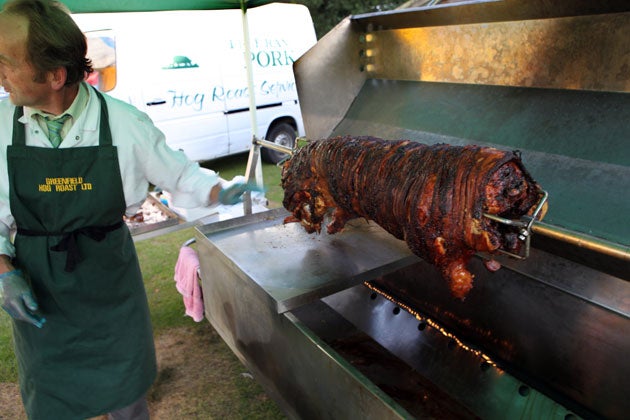This little piggy will feed 150 people...
Crispy yet tender, hog roasts are the latest must-have addition to upmarket barbecues. Nina Lakhani and Gareth Francis report

Christmas dinner wouldn't be the same without bacon round the turkey; now it seems a summer party is no longer complete without a hog roast.
The resurgence of this medieval culinary delight may have started in country fairs and beer festivals a decade ago, but it has spread to weddings, christenings, birthday parties and even funerals.
The number of hog roast companies across the country has risen more than tenfold over the past decade, according to Independent on Sunday research. And business is booming. Companies across the UK report a 100 per cent increase in bookings in the past two to three years as Britain rediscovers the lure of roasted hog and apple sauce rolls, washed down, of course, with a glass of cider or Pimm's.
The "wow factor" has played a part. No one forgets the sight or smell of their first pig on a spit, especially if they later turn vegetarian. It has celebrity status: the radio presenter Zoe Ball and her husband Norman Cook (Fat Boy Slim) have hosted several hog roast parties at their Brighton home; Kate Moss's medieval-themed 35th birthday party in January upset her vegetarian friend Stella McCartney, who was greeted by the sight of a spit roast.
Ball said: "We had our first hog roast for Norman's birthday a few years ago; we all dressed up as cowboys and did a bit of line dancing before 70 of us demolished the pig. And my mum had a tiny little suckling pig for her 60th birthday party a couple of weeks ago. There is definitely a wow factor but it also tastes amazing, smells fantastic and the whole thing is eaten from head to toe. We've had a share in an organically fed pig for the last few years, so we know what we're eating and that the pig has been humanely killed. It also means we don't have to risk getting poisoned by Norman, who is colour blind – not ideal for a barbecue."
Hog roasts also have the royal seal of approval: Lord Frederick Windsor and his sister Lady Gabriella fed guests at a joint birthday party with slices of basted pork.
To roast large joints of meat or whole animals over a fire, the meat is first skewered on a spit, then slowly rotated for hours. This allows the animal to cook evenly in its own juices, which results in tender meat with chunky, crispy crackling.
In medieval times, a servant boy, known as the "spit boy" or "spit jack", sat near the spit turning the rod slowly. Modern spits are now electric and operate without the need for child labour.
The recession is also playing its part in the hog revival. Even at the top end of the market, it costs less than £600 for the meat and caterers, compared with thousands of pounds for a sit-down meal to feed the same number of people.
One company in the South-east, Dukes Roasters, has sold 12 machines in the past week alone, against 26 in the whole of last year. Those buying up the spits are mainly non-professional caters – moonlighters trying to make some extra cash at the weekend.
But hog roasts remain a niche market, says the British Pig Association, accounting for an estimated 1 per cent of sales for British pig farmers.
Chris Pike, from the Educated Pig, a catering firm in Devon, said: "When we set up [in 1999], there were just four companies nationally worth their salt. Since then the market has exploded.
"It's a metaphor for the new way of thinking about food. It's a whole pig, and people know that it's local and it's fresh. It's not been fiddled with and has no additives. I've even had vegetarians hire us. It's the Jamie Oliver effect. It's back to basics."
Join our commenting forum
Join thought-provoking conversations, follow other Independent readers and see their replies
Comments
Bookmark popover
Removed from bookmarks